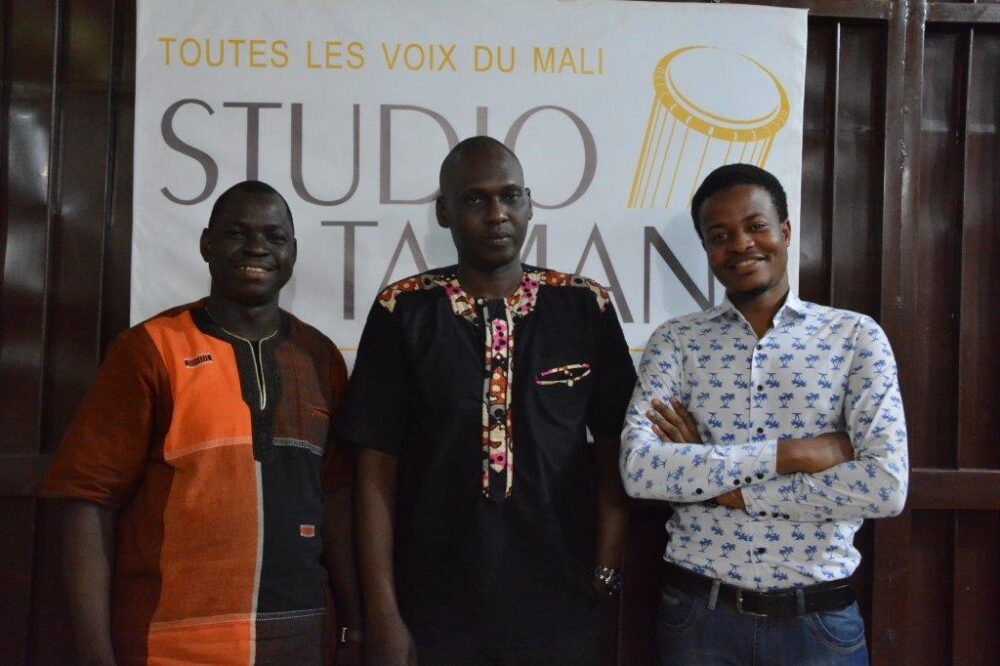Since the beginning of April, a new Malian editorial team ensures the daily management of the journalists‘ team of Studio Tamani, the information program created by Fondation Hirondelle in Mali. It is composed of an Editor-in-Chief, a Deputy Editor-in-Chief and a General Secretary. Their taking office is part of the sustainability process of Studio Tamani. They explain what’s at stake with these responsibilities.
What does it mean for you personally to take these new responsibilities at Studio Tamani ?
Issa Fakaba Sissoko, Editor-in-Chief: “This appointment as Editor-in-Chief of Studio Tamani has a double meaning for me: that of contributing to strengthening the achievements of the Tamani project from 2013 to the present day, but also and above all an opportunity to enrich my career and put into practice my vision and my project for the development of our newsroom. Being Editor-in-Chief is both a promotion for me, but a challenge: to contribute to the sustainability of the Studio Tamani project.
This appointment is a new stage in my professional career. It prepares me to take on other responsibilities in the future, and to put into practice what I have learned in the different courses in „Media Management“.”
Mouhamadou Touré, Deputy Editor-in-Chief: “This responsibility is a new challenge for us. We will overcome it with all of our collaborators. It calls us to more involvement and more rigor to ensure greater respect for the editorial line of Studio Tamani and strengthen the professionalism and cohesion of the Tamani team. It is also an opportunity for our entire editorial team to acquire new experiences and skills with the support of the entire Fondation Hirondelle that has allowed us to reach this level today.”
Sékou Gadjigo, General Secretary: “This responsibility is a mark of confidence that Fondation Hirondelle through its Studio Tamani project places in me. It is also a proof that Fondation Hirondelle wants to empower Malian journalists at Studio Tamani, especially in the context of the sustainability process of the studio. It requires a surpassing of oneself to raise even higher the image of Tamani through the involvement of all the newsroom, as well as our correspondents. This responsibility also implies that I am an example in all my behaviors in all the acts that I pose at Studio Tamani.”
What are the challenges to managing a team of journalists in Mali today ?
Issa Fakaba Sissoko: “The training, the coaching, the implication of the agents, the rigor, the organization, the anticipation, are essential for a better functioning of a newsroom. The setting up of Studio Tamani’s Editor-in-Chief comes as Mali prepares to hold general elections in a few months. And the role of journalists is essential. The challenge for a newsroom in Mali is to help support this process through professional coverage, with free, independent, credible, impartial information at the service of the people. The crisis context says no less about this need for professional information processing.
Our challenge is to be a model of journalism in Mali, in Africa, breaking with unsavory practices. Studio Tamani has already demonstrated this through coverage of the 2013 elections and the Algiers peace negotiation process.”
Mouhamadou Touré: “The challenges are enormous in this context of crisis in Mali and with the upcoming elections. We will have to pay a lot of attention in the treatment of information to maintain neutrality, independence and professionalism who have always accompanied Studio Tamani. The other challenge will be to train and coach journalists with the changing media environment. But the biggest challenge is to reinforce the team spirit that prevails at Studio Tamani. Together, we will meet all the challenges.”
Sékou Gadjigo: “The challenges are above all professionalism (independence, impartiality, verification of facts, balance). These are key principles for Fondation Hirondelle and which Studio Tamani has made its credo. Today Studio Tamani has established itself in the media landscape of Mali as a reference medium in the country. This through our productions that are taken up by newspapers, news sites, radio stations. It is therefore a question of maintaining this course. Another challenge is improving the quality of our productions and increasing our audience and the number of visitors to our site. For this reason we now rely heavily on the network of correspondents we are moving to other formats of production. Another challenge is the commitment and involvement of all of our journalists. And as General secretary of the newsroom, I must make sure that my colleagues are in good condition, and that they are aware of their responsibilities. I am also in charge of bringing added value to the work of our correspondents (more than thirty), all over the country, and to bring innovations in our editorial offers. We should therefore work to increase our audience, but also our visitors to our website and social networks.”

